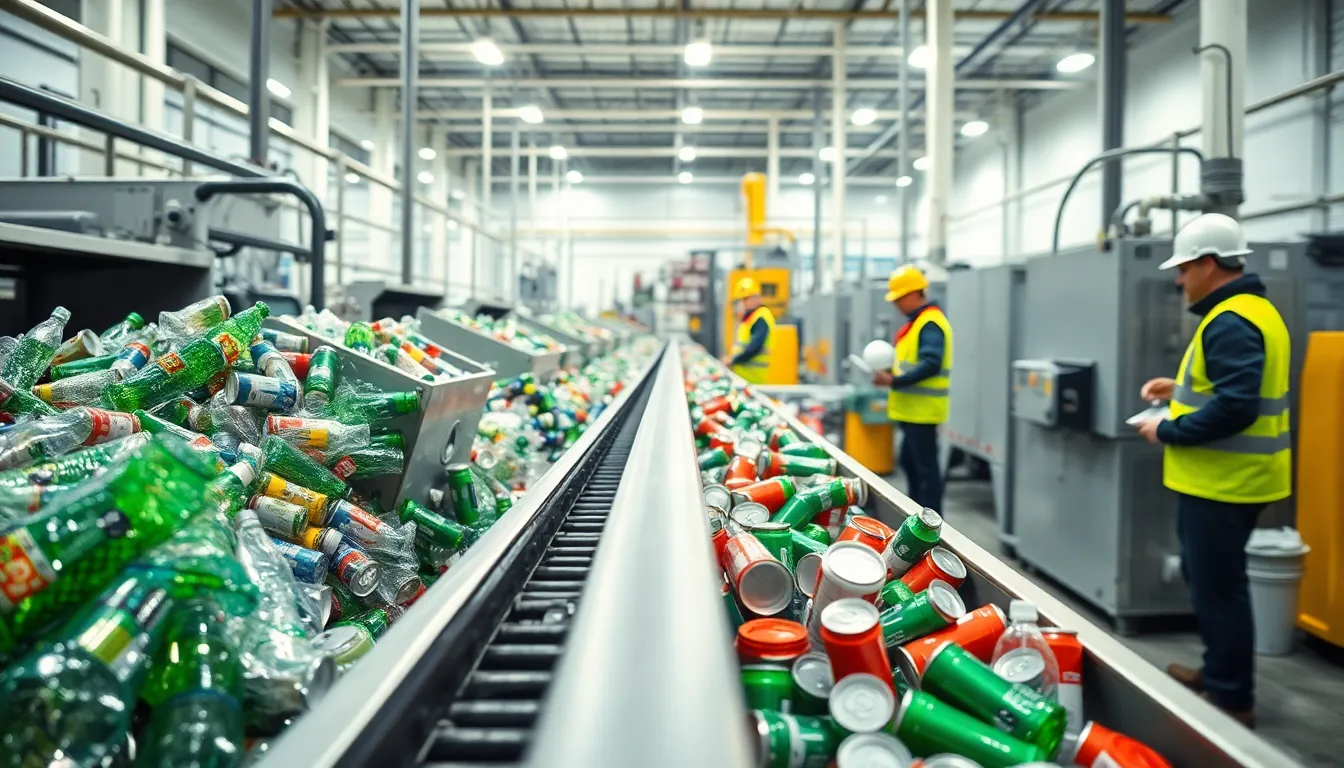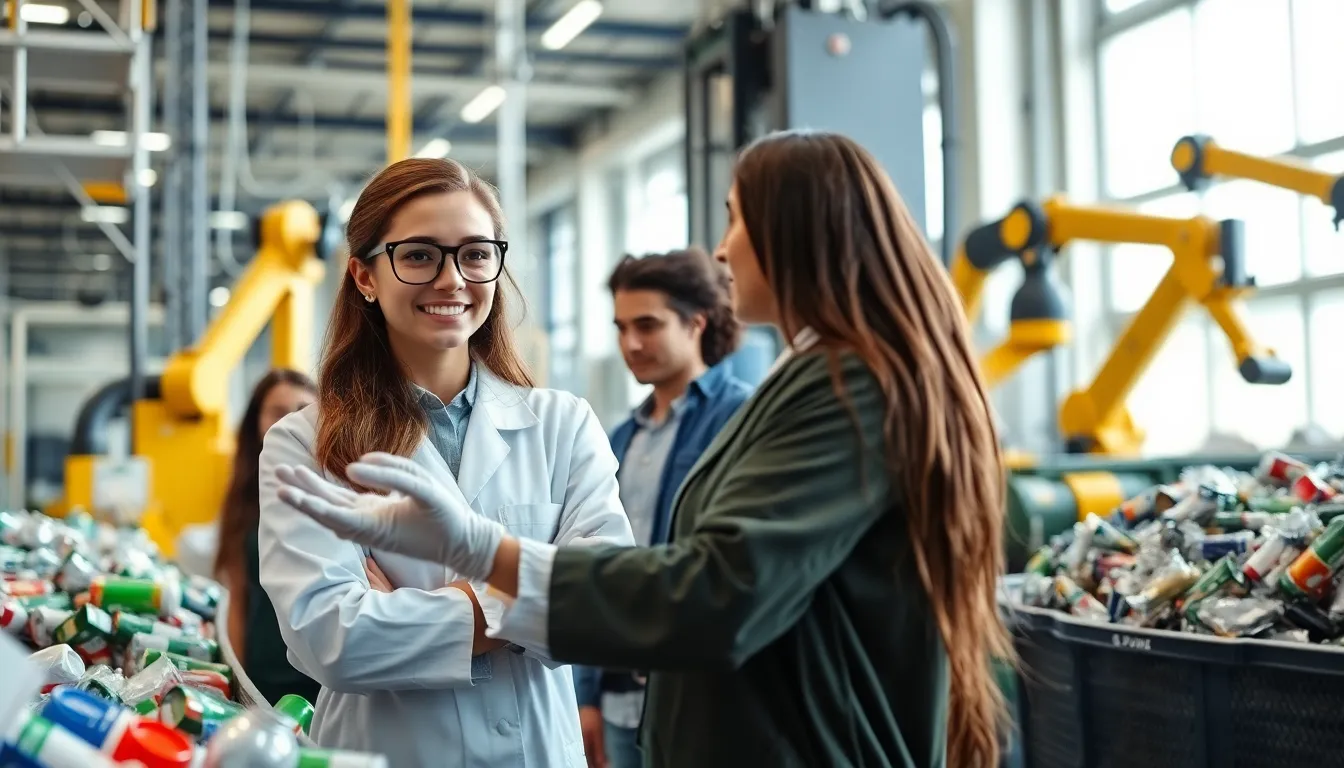Recycling technology is revolutionizing the way society handles waste, turning discarded materials into valuable resources. As environmental concerns grow, innovative solutions are emerging to improve recycling efficiency and reduce landfill impact. This technological shift not only conserves natural resources but also plays a crucial role in combating climate change.
From advanced sorting systems that streamline material recovery to cutting-edge processes that transform plastics and metals, recycling technology is paving the way for a sustainable future. With the right tools and techniques, industries can minimize waste and maximize the potential of recyclables. Understanding these advancements is essential for anyone interested in making a positive impact on the environment.
Table of Contents
ToggleOverview of Recycling Technology
Recycling technology encompasses systems and methods for converting waste materials into reusable resources. It includes processes that enhance the efficiency of sorting, processing, and repurposing materials. Advanced sorting systems utilize artificial intelligence and machine learning to identify and separate various recyclables with high accuracy.
Recycling plastics involves several specialized techniques, including mechanical recycling, where clean plastics are shredded, melted, and formed into new products. Chemical recycling breaks down polymers into their original monomers, allowing for the creation of high-quality materials.
Metals are recycled through processes such as shredding and melting. Automated systems ensure the separation of ferrous and non-ferrous metals, maximizing recovery rates. Innovative fabrication techniques lead to the production of new items from recycled metals, significantly reducing energy consumption compared to mining virgin resources.
Emerging technologies, such as biorecycling, leverage microorganisms to decompose organic waste. These biological processes convert waste into biogas or compost, contributing to sustainable waste management. Innovations in recycling technology continue to evolve, promoting resource efficiency and environmental sustainability across industries.
Types of Recycling Technologies

Recycling technologies encompass various methods that convert waste materials into reusable resources. Key types of recycling technologies include mechanical recycling, chemical recycling, and energy recovery.
Mechanical Recycling
Mechanical recycling involves physically processing materials to retrieve valuable components. This method applies to plastics, metals, and glass. The recycling process starts with sorting and cleaning the materials, followed by shredding into smaller pieces. These smaller pieces undergo further processing, such as extrusion or molding, creating new products. For example, PET plastics can be turned back into fibers for clothing or bedding. Mechanical recycling is efficient, commonly employed, and helps reduce landfill waste effectively.
Chemical Recycling
Chemical recycling utilizes chemical processes to break down polymers into their original monomers or other useful chemicals. This technology applies mainly to plastics that are difficult to recycle mechanically. For instance, chemical recycling can convert polyethylene and polypropylene back into feedstock for producing new plastics. This method enhances recycling rates while ensuring high-quality output. Chemical recycling is vital for managing complex plastic waste and reducing dependency on fossil fuels.
Energy Recovery
Energy recovery converts waste materials into usable energy through processes like combustion, gasification, or anaerobic digestion. This technology captures energy from non-recyclable materials, reducing the volume of waste sent to landfills. For example, incineration generates electricity while processing municipal solid waste. Anaerobic digestion produces biogas from organic waste, which can fuel power generation. Energy recovery offers a practical solution for managing waste while generating renewable energy sources.
Innovations in Recycling Technology
Innovations in recycling technology focus on enhancing efficiency and sustainability through advanced methodologies. Key advancements include sophisticated sorting systems and biorecycling techniques that transform waste management practices.
Advanced Sorting Systems
Advanced sorting systems leverage artificial intelligence and machine learning for precise material identification. Such systems enable the rapid classification of recyclables, reducing contamination rates. These technologies employ optical sensors, automated robotic arms, and smarter algorithms to optimize the sorting process. By integrating computerized systems, facilities can reclaim up to 95% of recyclable materials, significantly improving recycling rates. Studies indicate that these advancements not only streamline operations but also reduce operational costs by minimizing manual labor.
Biorecycling
Biorecycling represents a cutting-edge approach to waste management where microorganisms decompose organic materials. This technique converts organic waste into biogas or compost, offering a sustainable disposal solution. Specific microorganisms efficiently break down waste products such as food scraps and agricultural residues, turning them into renewable energy sources and nutrient-rich soil amendments. Research highlights that biorecycling can reduce methane emissions from landfills by 30%, presenting an effective method for waste diversion and resource recovery. Implementing biorecycling systems contributes significantly to achieving zero waste goals in communities and industries alike.
Challenges and Limitations
Recycling technology faces several challenges and limitations that hinder its effectiveness and widespread adoption. Addressing economic factors and environmental concerns proves essential for enhancing recycling systems.
Economic Factors
Economic factors significantly impact the implementation of recycling technologies. High initial costs of advanced equipment deter investment in new recycling systems. Operational expenses can escalate due to maintenance and energy consumption, affecting overall viability. Additionally, fluctuating market prices for recyclables lead to uncertainty in profitability, making it difficult for recycling facilities to maintain stable operations. A lack of government incentives also hampers growth in recycling industries, as operators may not find enough financial motivation to upgrade existing technologies or invest in innovative solutions.
Environmental Concerns
Environmental concerns arise from the limitations of current recycling technologies. Contamination issues, such as the presence of non-recyclable materials in recycling streams, reduce the quality and quantity of recycled output. Inefficient processes result in excess emissions during transportation and processing, contributing to air pollution. Moreover, the energy consumption associated with recycling operations can offset some environmental benefits. Areas with inadequate waste management infrastructure frequently experience higher levels of illegal dumping and lower recycling rates, exacerbating pollution. Addressing these environmental challenges requires ongoing research and development of more efficient and sustainable recycling technologies.
Future of Recycling Technology
The future of recycling technology promises significant advancements that will optimize waste management and resource recovery. Innovations in automation and artificial intelligence enhance sorting efficiency and effectiveness, making it possible to recover a broader range of recyclables.
Advanced Sorting Solutions
Advanced sorting solutions utilize AI algorithms that improve the precision of material identification. These systems can differentiate between various types of plastics, metals, and paper products, achieving classification accuracy rates exceeding 90%. Robotics facilitate faster sorting speeds, enabling processing plants to handle larger volumes of waste while maintaining high-quality output.
Chemical Recycling Evolution
Chemical recycling is expected to experience growth as researchers develop methods for breaking down mixed waste plastics into useable monomers. Techniques such as pyrolysis will facilitate processing complex polymers and significantly enhance the quality of recycled materials. With these advancements, chemical recycling may surpass mechanical recycling in efficiency, pushing overall recycling rates beyond the current standards.
Energy Recovery Innovations
Energy recovery technologies will likely evolve to capture larger amounts of energy from waste. Enhanced anaerobic digestion methods, such as co-digestion, will convert organic waste into biogas or biofertilizer, reducing landfill dependency. These innovations not only generate renewable energy but also contribute to reduced carbon footprints for waste management operations.
Integration of Smart Technologies
The integration of smart technologies into recycling systems will enable real-time data analytics. Sensors installed in waste bins and collection vehicles can track material composition and quantity, optimizing collection schedules and routes. This data leads to more efficient waste management practices, reducing operational costs and environmental impact.
Biorecycling Developments
Biorecycling technologies are expected to advance significantly, allowing for efficient decomposition of organics and hazardous materials. Microorganisms will play a vital role in transforming waste into valuable resources, such as biodiesel or organic fertilizers, further supporting sustainability goals.
Collaborative Efforts
Collaboration among industries, governments, and technology developers will drive innovation in recycling technology. Partnerships can lead to shared resources, knowledge exchange, and coordinated regulatory frameworks that promote the adoption of advanced systems. Such collaborations support research initiatives that address existing challenges and devise forward-thinking solutions.
Recycling technology is poised to transition towards a more circular economy, where waste becomes a resource. Continuous investment in research and development, along with industry-wide cooperation, will pave the way for sustainable practices that minimize waste and maximize recovery.
Recycling technology is poised to reshape waste management and resource recovery. As innovations emerge in automation and artificial intelligence, the potential for enhanced sorting efficiency and higher recovery rates becomes increasingly attainable. The shift toward a circular economy relies on collaboration among industries and governments to tackle existing challenges.
By embracing advanced technologies and fostering a culture of sustainability, society can significantly reduce waste and promote resource efficiency. The future of recycling holds promise, with ongoing research paving the way for solutions that not only address environmental concerns but also create valuable resources from what was once considered waste.





